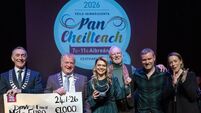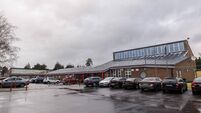Living Above the Shop: Duggan’s – last of the independents
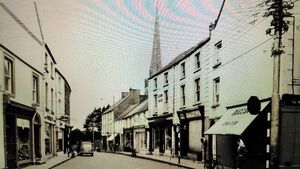
Duggan's shop on the corner of Dublin Street and Castle Hill
THIS week’s focus is on a business that was situated at Market Cross in Carlow town.
A lot of younger people will not be aware of where Market Cross is, as it’s not often referred to as such anymore, but in days of old it was the absolute centre of commercial life in Carlow. In bygone days, the crossroads at the end of Tullow Street, where it meets Dublin Street, Burrin Street and Castle Street, used to hold a large market every day. Dealers would set up their stalls with fish, meat, clothes and all kinds of goods on offer there. Carlow Castle gate stood at this crossroads. In later years, it was often referred to as Duggan’s Cross, referring to the business that stood proudly on the corner, currently bearing the name ‘Bramley’.
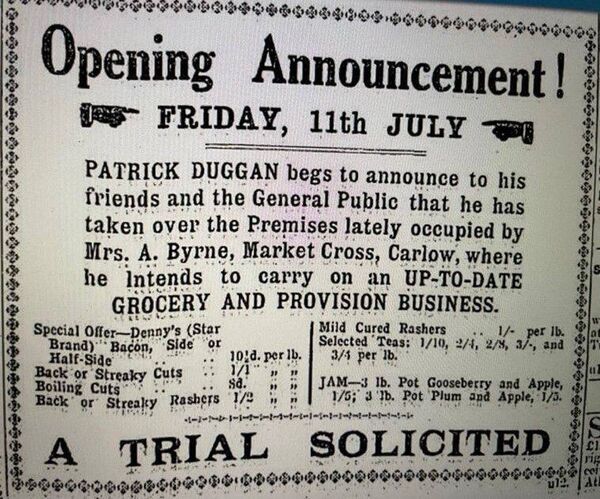
In 1912, Pat Duggan came to Carlow and worked in Doyle’s of the Shamrock, eventually becoming a manager there. In 1930, he was ready to start his own business and bought 64 Dublin Street from a Mrs Byrne for £850. Her husband Michael Byrne had been a bacon curer and lard refiner. Prior to that, the premises was owned by Thomas Richards, ironmonger. The building can be dated back to 1712, when it was described as a brewhouse and gatehouse owned by a John Cooper, with ground rent being paid to Henry, Earl of Thomond.
To mark the opening of his new shop, Pat put a rather grandiose announcement in stating ‘Patrick Duggan begs to announce to his friends and the general public, that he has taken over the premises occupied by Mrs A Byrne, Market Cross, Carlow, where he intends to carry on an up-to-date grocery and provision business!’ He had recently married his wife Kathleen, who was 19 years his junior and a complete stranger to Carlow, hailing from Ballina, Co Mayo. Within a year, their first child Peter was born. The Duggans went on to have 14 more children (13 of whom lived to adulthood), the youngest of whom, Colman, contributed to this article. With so many mouths to feed, it was surprising that the Duggans made any money at all from their grocery business, as they were their own best customers, but somehow Pat and Katie made it work and managed to feed, clothe and educate their family very well. Two sons became priests in Seattle and two of the girls became nuns, with a wide variety of professions encompassing the rest of the family.
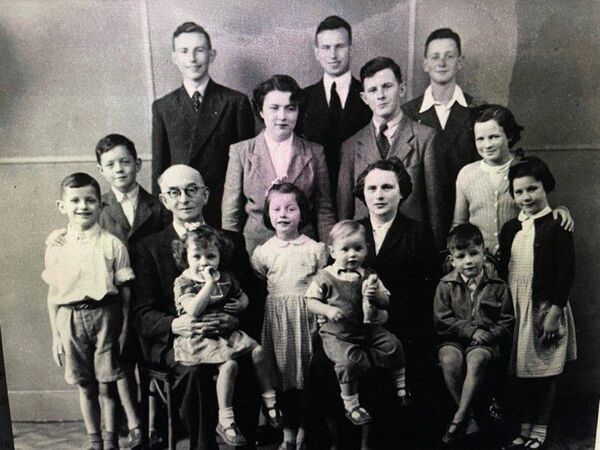
Duggan’s was essentially a grocery shop, specialising in bacon and ham. At the time there were a lot of small grocers within a stone’s throw – another Duggan’s (no relation), Restrick’s, Leverett and Fry and Tom McDonnell’s. With a house full of children, there was always work to be done and all the family helped out in the shop. Sugar and tea had to be filled into bags from large chests as well as fruits such as sultanas and raisins. On Thursdays, all the shops in Carlow closed for either a full or half-day and this was when Pat Duggan cooked hams for the week over a stove in a very large pot. On Saturday evenings, the shop was open until 9pm, which was very popular with farmers and their wives, who came in to town to shop once a week when their day’s work was over.
Custom in the shop was mostly on credit and the Duggans ran a ‘book’ for people, which would be settled on pay day or at the end of the month. Living in the centre of the town, Oliver remembers that all the business people and their families went in and out of one another’s houses in a neighbourly way. Young and old could call in at any time and all the children played together in gardens or on the street. A coal grate on the Castle Street side of their premises proved profitable for the young Oliver, as coins which had fallen from people’s pockets and purses would drop through and could be collected from below.
Positioned as it was on the crossroads of the centre of activity in Carlow town gave Duggan’s a bird’s eye view of everything that was going on. Oliver remembers the excitement of Tullow Street lit up with Christmas lights on December evenings with shoppers coming and going, crowding the street. When Haddens introduced the first gas-filled balloons in Carlow in the 1960s, they were a great novelty. Oliver, like many children, let his balloon go almost immediately and had to watch the sorry sight of it drifting over the rooftops skyward.
When groups of what were known as ‘corner boys’ congregated at the side of Duggan’s in the evenings, Kathleen would ask them to disperse, but if they failed to do so, she was known to throw a bucket of water out the upstairs window, which had the desired effect!
Duggan's, like a lot of grocery shops at the time, also did deliveries, always having a messenger boy employed. Provisions were delivered to the Mercy and Presentation convents, and bread, free of charge, to the Poor Clares in Graiguecullen. A tradition at the time when a funeral passed by the shop was to close the door and blinds as a mark of respect. In Kathleen’s obituary, written by Oliver Snoddy, Duggan’s was purported to be a ‘house where all were treated alike’. Kathleen was described as a woman of ‘humble charm’ who lived a life of ‘resignation, kindness and optimism’.
With the advent of supermarkets like Five Star and Darrers moving into the town centre, the demise of the small, family-run grocery shop began and in 1965 Pat and Kathleen decided to retire from the business and moved to Court Place. By then, many of their family were living away from home. The premises was bought by the Bramley family, who extended their jewellery business.
